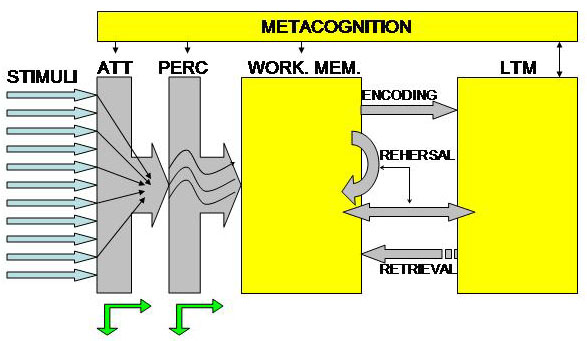One of the most widely
studied explanations of human learning is the Information Processing
(IP) model, a framework derived from early models of computer
memory that focused on information encoding,
storage and retrieval.
According to IP theory, environmental stimuli
begin the encoding process through a sensory
register, which--through selective perception--determines
what will be utilized in working memory,
a short-term workspace where limited
chunks of information are activated
and then either stored via rehearsal
in long-term memory or forgotten.

One of the more celebrated theories derived from
the IP model is Robert Gagne's
Conditions of Learning theory,
which identified five types of learning
outcomes for instruction, each of which required unique
conditions for learning to occur:
1) intellectual skills
2) cognitive strategies
3) verbal information
4) motor skills
5) attitudes
Although this theoretical framework included many
different types of learning, the majority of his professional
writing focused on intellectual skills.
Perhaps his most important contribution to the field was the development
of nine instructional events and
their corresponding cognitive processes, which continue to serve
as the foundation for many Instructional Design models.
1) gaining attention (reception)
2) informing learners of the objective (expectancy)
3) stimulating recall of prior learning (retrieval)
4) presenting the stimulus (selective perception)
5) providing learning guidance (semantic encoding)
6) eliciting performance (responding)
7) providing feedback (reinforcement)
8) assessing performance (retrieval)
9) enhancing retention and transfer (generalization)
|


